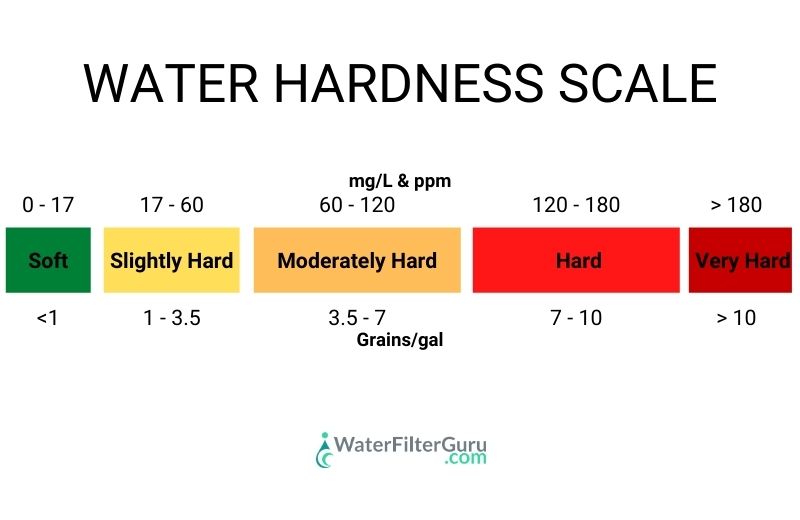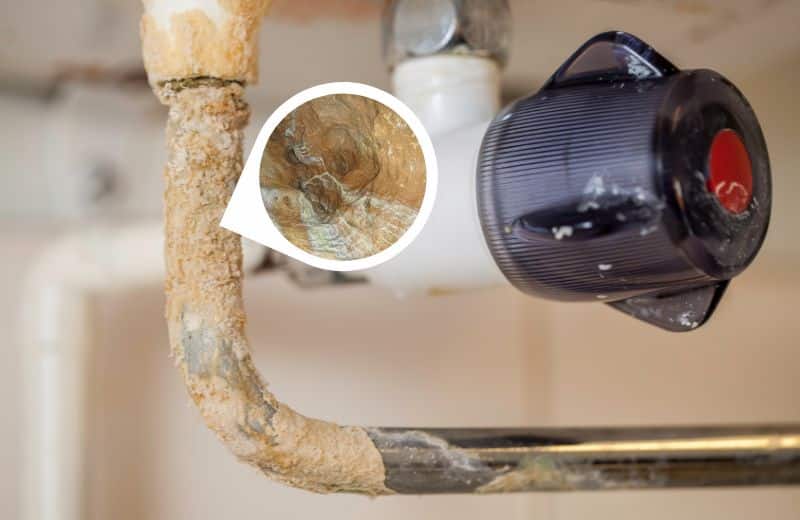Most of us know that hard water can be damaging, forming limescale that clogs pipes, reduces water flow and shortens the lifespan of appliances. We all have varying levels of water hardness, and you might be wondering what is ideal, or at least acceptable, in order to prevent scale formation.
In this guide, I’ll be looking at hard water, how it’s measured, and how to test for it. I’ll also discuss the acceptable and ideal levels of water hardness, and answer your commonly asked questions.
Table of Contents
🤔 What is Hard Water?
Water hardness refers to the amount of dissolved magnesium and calcium in a water supply. The more dissolved minerals, the harder the water. If your water is hard, you may notice “soap scum”, a film of residue that lingers on your skin after washing with soap and hard water. You’ll need more soap or detergent to get things clean than you would with soft water.
💭 How to Test Water Hardness?
If you have hard water problems in your home, you may want to test your water hardness. You can do this in a number of ways, depending on the accuracy of the results you’re looking for.
A simple way to test water hardness is to add water and a teaspoon of dish soap to a water bottle, then close the lid and shake the bottle. If, rather than foam or bubbles, the water forms a milky film, it’s an indication that you’re dealing with a hard water issue.
For an idea of how hard your water is, you can use an at-home water hardness kit. At-home testing kits contain test strips that you should dip in a sample of your water. The color the strip turns indicates your water’s hardness.

Finally, you can get your water hardness tested by a certified laboratory, which will give you an understanding of exactly how hard your water is, measured in grains per gallon and parts per million.
I’ve written a complete guide on how to test water hardness here if you’re looking for more guidance in this area.

🧐 How is Hard Water Measured
Water hardness is measured in parts per million (PPM) and grains per gallon (GPG).

| Hardness | Grains per Gallon (GPG) | Parts per Million (PPM) & mg/L |
|---|---|---|
| Soft | <1 | 0 – 17 |
| Slightly Hard | 1 – 3.5 | 17 – 60 |
| Moderately Hard | 3.5 – 7 | 60 – 120 |
| Hard | 7 – 10 | 120 – 180 |
| Very Hard | >10 | >180 |
Grains per Gallon (GPG)
Grains per gallon is a measure of your water’s hardness. If you test your water for hardness at home, you’ll probably receive a result in GPG. This is the most commonly used measurement for hardness.
Most water softeners are measured in GPG, which indicates their grain capacity. A single grain per gallon is equal to 17.14 parts per million. The majority of softeners have a grain capacity of between 20,000 and 80,000.
Parts per Million (PPM)
Parts per million is a unit that describes how much dissolved calcium and magnesium a water source contains. So, if your water contained 1 PPM of hardness, it would have one unit of dissolved calcium and magnesium in one million units of water.
You may also hear hardness described in milligrams per liter, or mg/l. Milligrams per liter is equal to parts per million.
Related: Check Out Our Water Hardness Calculator
📏 Water Hardness Scale
To get an idea of how hard your water is when compared to the national average, you can take a look at the below water hardness scale.

🙋 What are Acceptable Levels of Water Hardness?
Water with between 3 and 7 GPG of hardness is considered moderately hard, and this is usually considered the acceptable level of water hardness. While you may still experience issues with your home water supply, such as spotting on your dishes and dry skin, this level of hardness is more manageable, and won’t pose a serious limescale issue.
Still, you may feel that even moderately hard water is too hard for your home. Even low amounts of calcium and magnesium can affect your water quality. In that case, you should look to decrease your home’s hard water to the ideal water hardness.
📌 What is the Ideal Water Hardness?
Water with between 0 and 3 GPG of hardness is considered soft. If your water is already this soft, that’s great – you won’t need to invest in a water softening solution. However, if you do need a water softener, most water softeners are capable of bringing your calcium and magnesium levels right down, resulting in a hardness measurement of less than 3 GPG.
💡 Frequently Asked Questions
What is the best water treatment option for hard water?
If you’ve determined that you have hard water, your next step is to figure out how to deal with it. A water softener is the most obvious, and most effective, water treatment solution for hard water. This type of system uses a process known as ion exchange to remove dissolved minerals from water considered very hard, improving water quality.

An alternative treatment to a water softener is a conditioning unit. Conditioning water systems cause calcium carbonate to crystalize, preventing scale formation. Some people prefer this option as it doesn’t add salt, but others would prefer the hardness mineral ions to be removed from water entirely, resulting in “properly soft” water.
Should I soften my water?
It’s your choice whether you soften your water or not.
But if you’re noticing water quality issues in your home, such as soap scum, dry hair and skin, hard water deposits on your glassware and dishes, reduced efficiency in your water heaters, washing machines and other at-home water systems, and extra effort with laundry, you may want to look into purchasing a water softener. This will help improve the efficiency of your appliance, reduce the effects of hard water on your hair and skin, and more.
Why is hard water such a problem?
A high concentration of calcium carbonate minerals can cause a buildup of residue on surfaces that come into contact with your water, known as limescale. This scale can be very damaging to your pipes, plumbing, and fixtures.

Water will meet resistance as it travels through your pipes, which will affect water flow. Eventually, your pipes may become so clogged with scale that they need to be replaced. Your home’s appliances may also be damaged by a buildup of minerals, and you may need to replace them earlier than expected. Using a softening solution to remove minerals or prevent them from sticking to surfaces will eliminate a scale issue in your plumbing.
Is hard water bad for your health?
No. If your drinking water is hard, for most people it’s not unhealthy or dangerous to drink. In fact, our bodies need magnesium and calcium carbonate for health purposes – so drinking hard water is actually good for your health . However, it’s important to understand that the mineral ions in hard water are much more prevalent in our foods. So, as long as you’re following a varied diet, drinking soft water won’t make you any less healthy than if you drink water considered very hard.

We have a water hardness level of 168. Should we buy a water filter to save our appliances and pipes?
At 168 mg/L, your water is considered hard, and I would recommend treating it. You’ll need an ion exchange water softener (water filters do not treat hardness).
What might occur if your hard water is 35 and you have your soft water system set to 120 ?
Hey John, thanks for your comment. Can you clarify to help me understand the situation a bit better? Are you saying your raw water has a hardness of 35 mg/L, yet your water softener is set to a hardness of 120 mg/L?
what does it mean if the pond water hardness is 176mg/lit??
176 mg/L is hard water